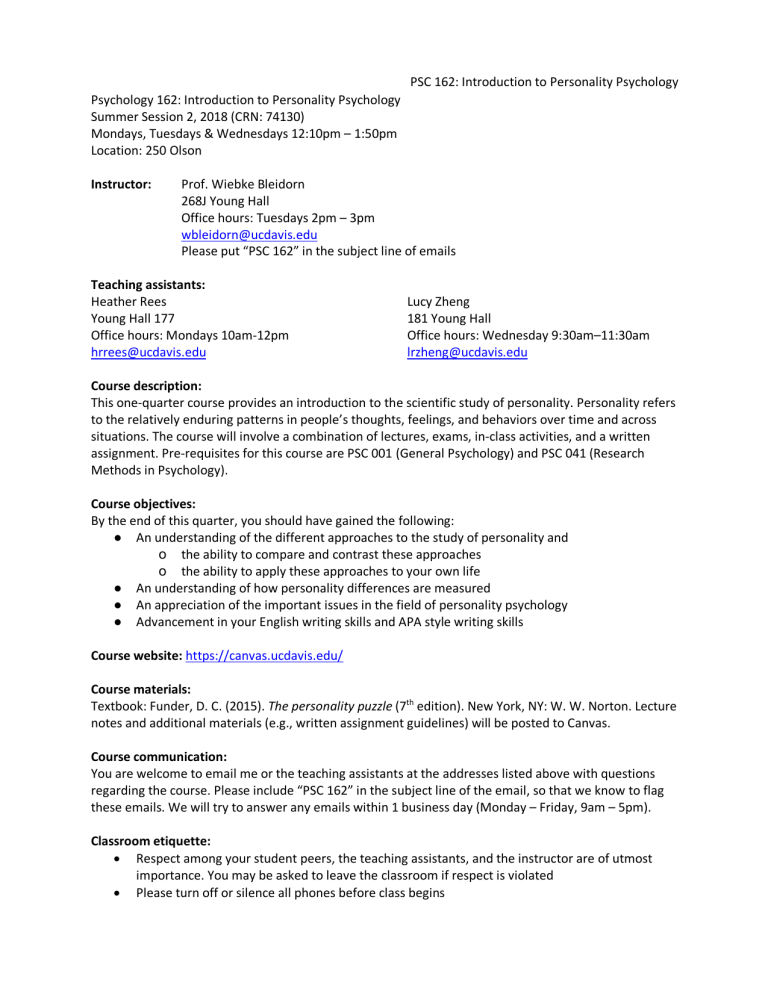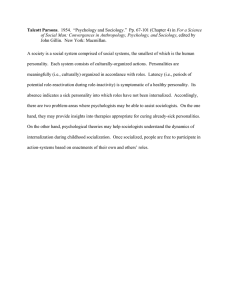
PSC 162: Introduction to Personality Psychology Psychology 162: Introduction to Personality Psychology Summer Session 2, 2018 (CRN: 74130) Mondays, Tuesdays & Wednesdays 12:10pm – 1:50pm Location: 250 Olson Instructor: Prof. Wiebke Bleidorn 268J Young Hall Office hours: Tuesdays 2pm – 3pm wbleidorn@ucdavis.edu Please put “PSC 162” in the subject line of emails Teaching assistants: Heather Rees Young Hall 177 Office hours: Mondays 10am-12pm hrrees@ucdavis.edu Lucy Zheng 181 Young Hall Office hours: Wednesday 9:30am–11:30am lrzheng@ucdavis.edu Course description: This one-quarter course provides an introduction to the scientific study of personality. Personality refers to the relatively enduring patterns in people’s thoughts, feelings, and behaviors over time and across situations. The course will involve a combination of lectures, exams, in-class activities, and a written assignment. Pre-requisites for this course are PSC 001 (General Psychology) and PSC 041 (Research Methods in Psychology). Course objectives: By the end of this quarter, you should have gained the following: ● An understanding of the different approaches to the study of personality and o the ability to compare and contrast these approaches o the ability to apply these approaches to your own life ● An understanding of how personality differences are measured ● An appreciation of the important issues in the field of personality psychology ● Advancement in your English writing skills and APA style writing skills Course website: https://canvas.ucdavis.edu/ Course materials: Textbook: Funder, D. C. (2015). The personality puzzle (7th edition). New York, NY: W. W. Norton. Lecture notes and additional materials (e.g., written assignment guidelines) will be posted to Canvas. Course communication: You are welcome to email me or the teaching assistants at the addresses listed above with questions regarding the course. Please include “PSC 162” in the subject line of the email, so that we know to flag these emails. We will try to answer any emails within 1 business day (Monday – Friday, 9am – 5pm). Classroom etiquette: • Respect among your student peers, the teaching assistants, and the instructor are of utmost importance. You may be asked to leave the classroom if respect is violated • Please turn off or silence all phones before class begins • PSC 162: Introduction to Personality Psychology Please arrive on time for class. This, along with silencing your cell phone and only using laptops for classroom-related activities, is a courtesy to your student peers, the teaching assistants, and the instructon Exams: There will be two in-class exams, each covering roughly one half of the assigned readings and lectures (i.e., these exams are non-cumulative). There will be one cumulative, optional final exam, which can be substituted for a missed exam or a low score on an exam. Each exam will be comprised of 50 multiplechoice questions. Each question is worth 1 point. There will be no curves applied to exams. There will be no make-up exams given for any reason. If you anticipate missing 1 or more exams, you should consider taking PSC 162 during a later quarter. Exam study guides will be posted to Canvas during the week before each exam. Please arrive on time for exams. As per UC Davis policy, we will not be able to allow students to take the exam after the first student has handed in the exam. On exam days, please bring a UC Davis 2000 Scantron (blue or red), No. 2 pencil, and eraser. Written Assignment: This course is a General Education Writing Experience Course. You are required to write a 5-6-page paper. The paper (50 points) is due on September 5th, 2018 before 6pm. Descriptions of the assignment will be posted to Canvas and explained in class. Your writing will be evaluated not only for content, but also for organization, style, use of language, and logical coherence. Your paper must be written in American Psychological Association (APA) style. Please refer to the Publication Manual of the American Psychological Association for guidance on both style and format. If you are unfamiliar with writing in Psychology, we suggest that you consult other resources for scientific writing. The APA style section of Purdue University’s Online Writing Lab (OWL) is especially helpful at https://owl.english.purdue.edu/owl/resource/560/01/. After you have received your graded paper, you can make an appointment to discuss your paper with the instructor or teaching assistants. Extra credit: You may earn up to 4 extra credit points by participating in 4 hours of research studies. Please visit http://pscresearch.faculty.ucdavis.edu/extra-credit/ for more information about participating in research for extra credit. I strongly recommended that you keep track of the number of extra credit points you receive, because I will not receive that information until finals week. All inquiries regarding your participation in these studies should be directed to Leigh Smith, the subject pool coordinator, at spcoordinator@ucdavis.edu. You may earn 1 additional extra credit point for completing the course evaluation for this course (http://eval.ucdavis.edu/ ). We will send you a reminder at the end of the summer session. Accommodations: Please contact us at early if you have a documented disability and are registered with the Student Disability Center (SDC). We will do our best to accommodate your needs with regard to the lectures and the exams. In order to do so, please make sure to contact us at least one week before each exam and confirm the details by email. PSC 162: Introduction to Personality Psychology Grading: The total number of course points available is 150 (+5 extra credit points). Your grade will be based on the number of points that you earn on your exam scores, your written assignment, class participation, and any extra credit you complete. There will be NO curve applied to the final grade. Once grades have been submitted to the Registrar’s Office, the grades are final and you may not barter for a higher grade. Questions regarding grades will only be addressed in person. In other words, the instructor and the teaching assistants will not answer questions about grading over e-mail. The grading scale is as follows: Letter Grade Percentage A 93 – 100% A90 – 92.99% B+ 87 – 89.99% B 83 – 86.99% B80 – 82.99% C+ 77 – 79.99% C 73 – 76.99% C70 – 72.99% D+ 67 – 69.99% D 63 – 66.99% D60 – 62.99% F < 60% Note: I will not round grades. Points 140 – 150 135 – 139 131 – 134 125 – 130 120 – 124 116 – 119 110 – 115 105 – 109 101– 104 95 – 100 90 – 94 < 90 PSC 162: Introduction to Personality Psychology Schedule Date Topic Reading 08/06/18 Course syllabus + The Study of the Person Chapter 1 08/07/18 Personality Research Methods Chapter 2 08/08/18 Assessment Chapter 3 08/13/18 08/14/18 Personality Traits, Situations, and Behavior & Personality Judgment Using Personality Traits to Understand Behavior & How to Write A Good Paper Chapter 4 & 5 Chapter 6 08/15/18 Personality Development, Stability, and Change Chapter 7 08/20/18 The Anatomy and Physiology of Personality Chapter 8 08/21/18 Behavioral Genetics and Evolutionary Psychology Chapter 9 08/22/18 Exam 1: Chapters 1-9 08/27/18 08/28/18 08/29/18 Basics of Psychoanalysis Written Assignment: Q & A Psychoanalysis after Freud Written Assignment: Q & A Humanistic and Positive Psychology Written Assignment: Q & A Chapter 10 Chapter 11 Chapter 12 09/03/18 No Class 09/04/18 Cultural Variation in Experience, Behavior, and Personality Chapter 13 09/05/18 The Self (Written Assignment Due*) Chapter 16 09/10/18 Personality, Mental Health, and Physical Health Chapter 17 09/11/18 Exam 2: Chapters 10-13, 15 & 17 09/12/18 Optional Final Exam: Cumulative Note: Schedule is subject to change. Any changes will be announced in class and via email. *You are responsible for submitting the written assignment. *Submit to Canvas.



